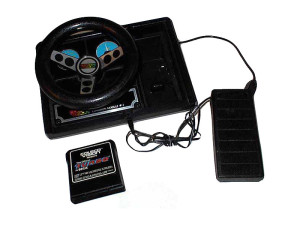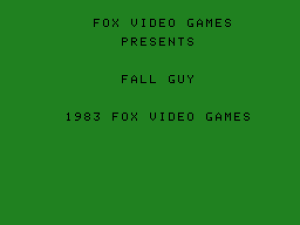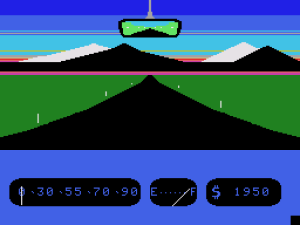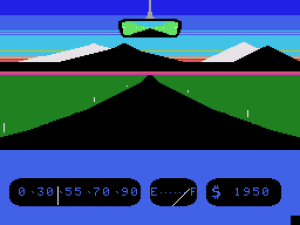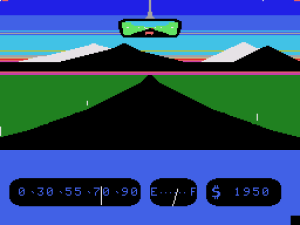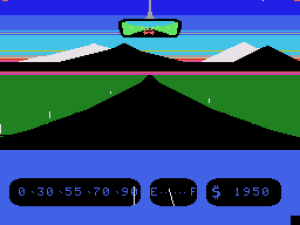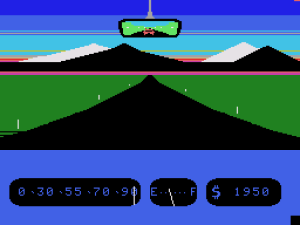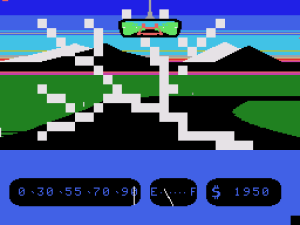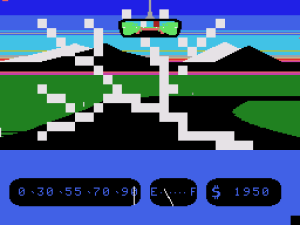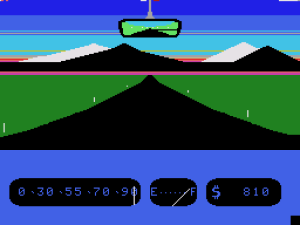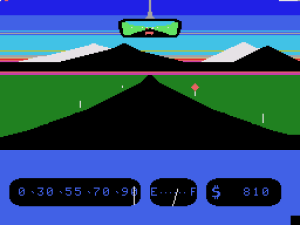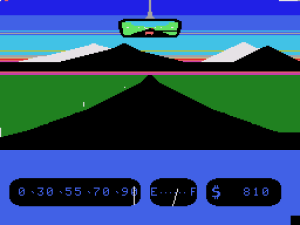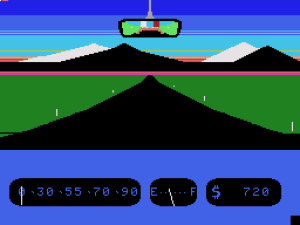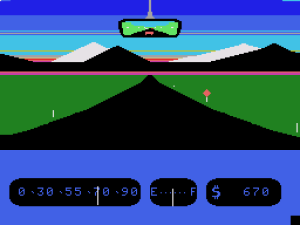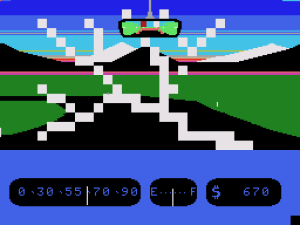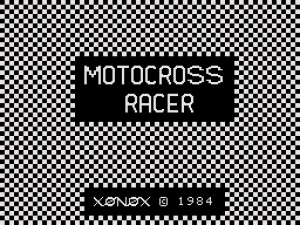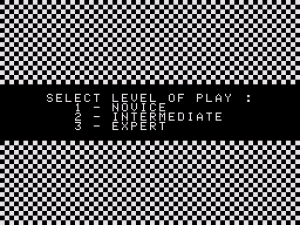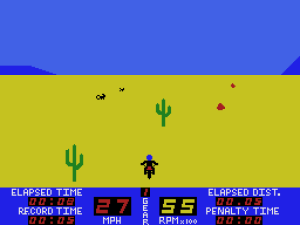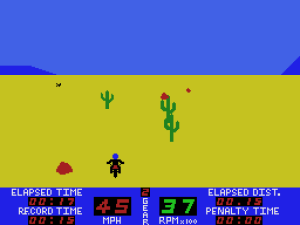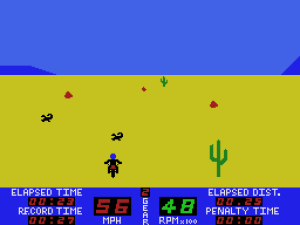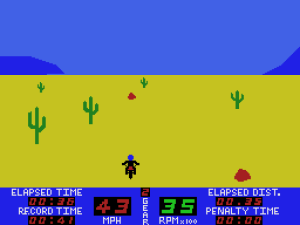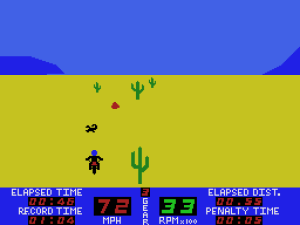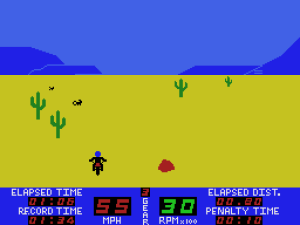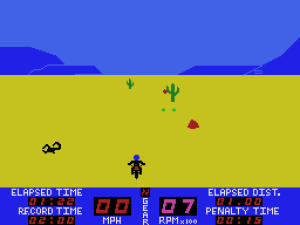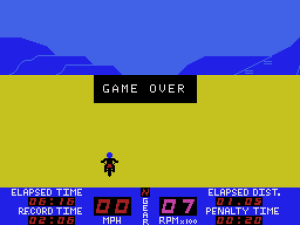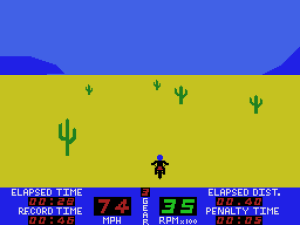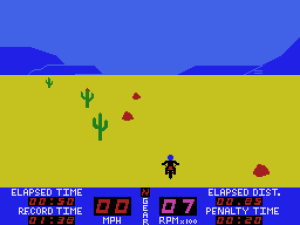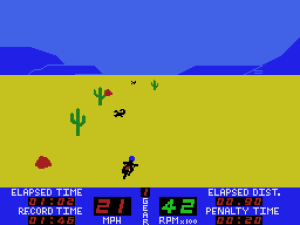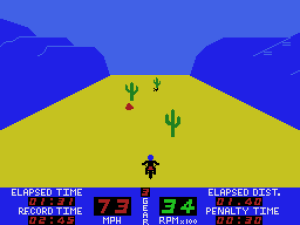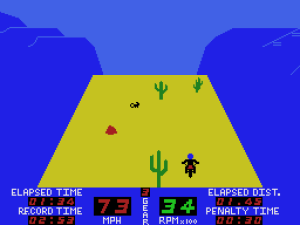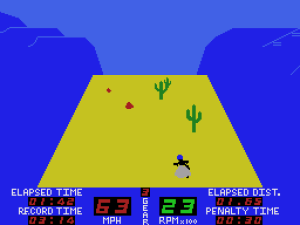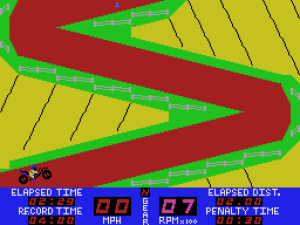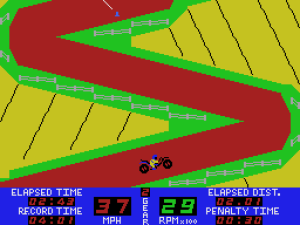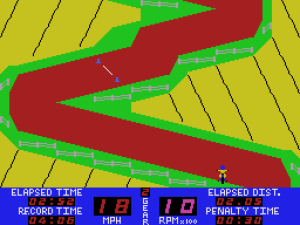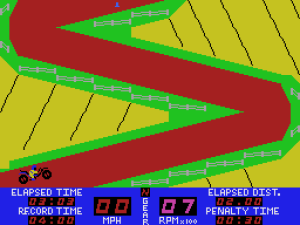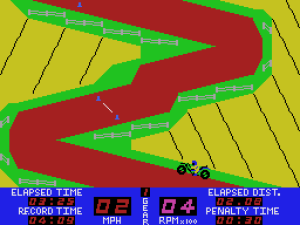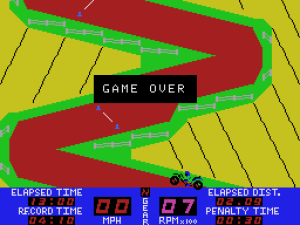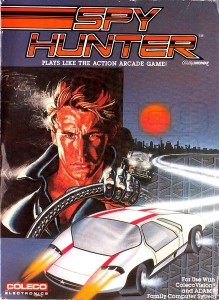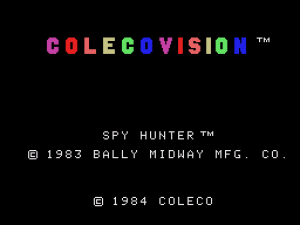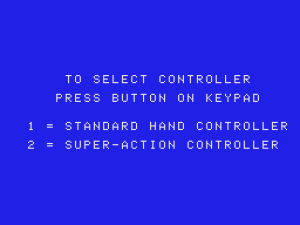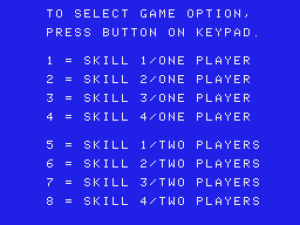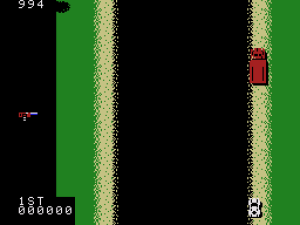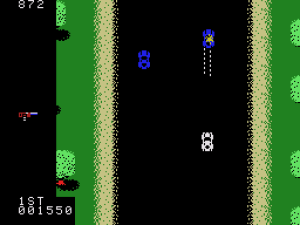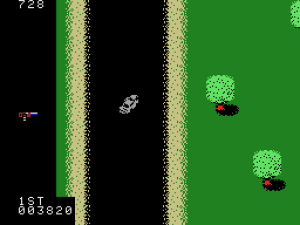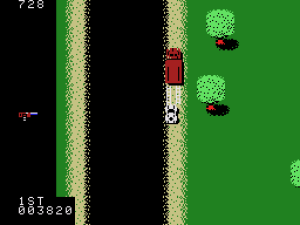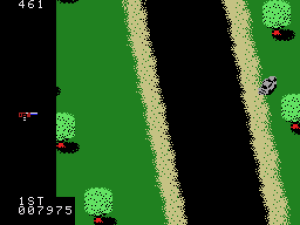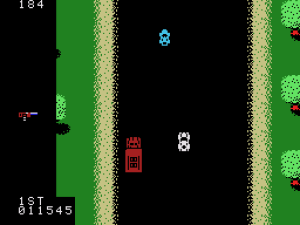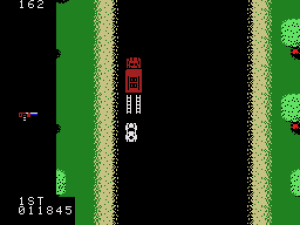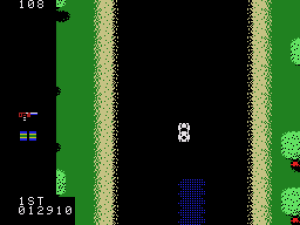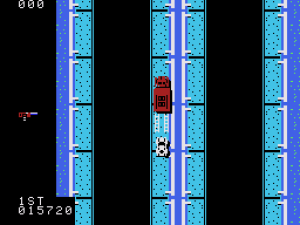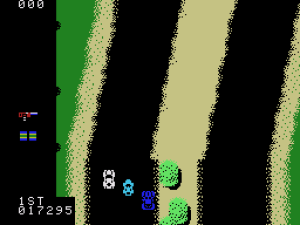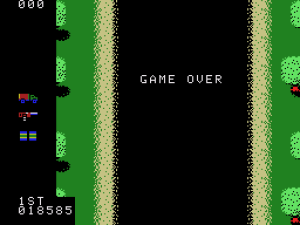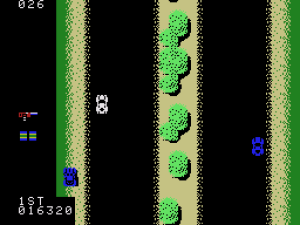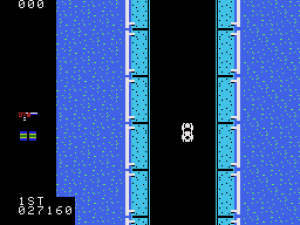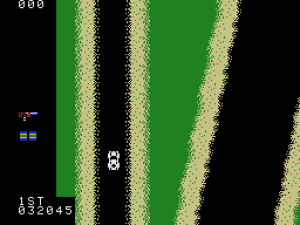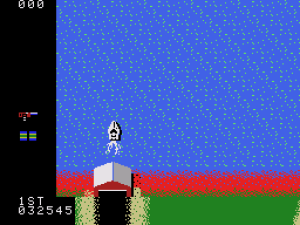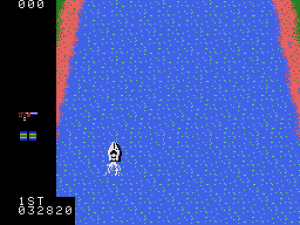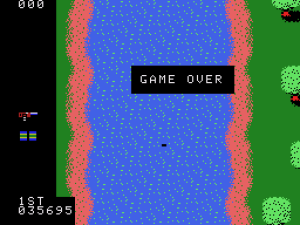A great, powerful system that was also bunged by goofy telephone-joystick controllers, the ColecoVision was another high-profile victim of the 1983 video game market crash. This console had some serious power packed inside, and it could handle most arcade ports better than any other home console back in 1982.
And then the crash, and Coleco pulled out of video games and put their future in the hands of their Cabbage Patch Kids. They chose… poorly.
With such a short life-span, the system never had a chance to amass a collection of true classics like the Atari 2600 had. Many of the games released for the ColecoVision were even sloppy and badly coded, with better versions appearing on game consoles with less impressive capabilities.
But before the crash, Coleco seemed damn serious about bringing an authentic arcade experience into homes with it’s machine. There were different accessories released that would allow for different styles of game control, a high-priced add-on set that turned your ColecoVision into a computer, and even an add-on that allowed you to play Atari 2600 games on your ColecoVision.
I’ve always thought that the ColecoVision story was the first clear example of a lot of great potential being cut short and wasted so early due to circumstances beyond a company’s control in the video game industry. As Nintendo showed everybody in North America in 1985, video games were not just a fad. If Coleco had had the foresight to stick with things, lay low for a while and try again after a couple of years, they might have been the ones who’s name became synonymous with video games in the mid ’80s.
The processor inside the ColecoVision was powerful enough to see life beyond 1982. In fact the Zilog Z80 was very popular in the 1980s, and powered many top-selling computers and game consoles. It’s because of this that I’m able to play my ColecoVision games on the excellent MEKA emulator. MEKA is primarily a Sega Master System emulator, but I also use it for ColecoVision and Sega SG-1000 games.
Again, I found five racing games for the ColecoVision. Two of these require one of those add-ons, the creatively named “Expansion Module #2”.
From what I can tell, this was the first steering wheel controller released for a home video game console. It even includes an acceleration pedal. This must have made the supported games quite an experience.
Unfortunately for me, this makes playing those supported games on an emulator kind of hard. “Dukes of Hazzard” requires the steering wheel to play, and the game is completely unplayable with the MEKA emulator. Using an older emulator called ADAMEm on my old Windows 98 computer will allow me to drive the car, but I still can’t steer it. Bo and Luke Duke will have to wait before they see their moment of glory.
And again, there is a version of Sega’s Turbo. I can’t get this game to start at all in either emulator. So I guess that’s that.
Fall Guy (1983)
This game wasn’t actually ever released. It’s a prototype, and it looks to be unfinished and lacking key features. So why am I reviewing it?
Because for what it is, it’s actually kind of fun.
It’s based on the TV series of the same name. I don’t know if plans were made to utilize the steering wheel controller with this game, but the prototype uses the “action” buttons to steer. This is odd, to say the least. If you’re on the straightaway, pressing the button will spin you instantly around to face the opposite direction.
The game sounds are very good. The sound chip in the ColecoVision was way better than what other consoles had at the time.
Pushing forward on the joystick accelerates, and pulling back decelerates. The speedometer is responsive, though I don’t think that gas tank gauge is really functional.
It seems to go from empty to full more or less at random. And I seem to have attracted the attention of the Police, as you can see in my rearview mirror.
The cop car gets closer. You can also see that I’ve started out with almost $2000 in funds. I don’t know what the purpose of the money would have been in this game, but you do lose money every time you crash, or for other reasons which I couldn’t really tell why.
Smokey’s on my tail! Pushing the car to maximum speed looks and sounds great. I really wish they would have finished this game.
And I crashed. I don’t know why though. I’ve read that you can’t take turns at more than 55mph, so maybe this is why.
The police car comes closer, even after I’ve already crashed.
Now you can see I have a full gas tank again. And I’ve lost more than half of my money.
I’m speeding again because it feels good, man.
And the cops are on the case once more.
This time I came to a stop to see what would happen. It appears that I just lost some more money, and that was it.
So off I go again…
Until I hit the next turn too fast. I did try to slow down that time though.
I’m going to guess that this game was never completed because of the 1983 crash. It’s too bad, because even in its unfinished state, I see a lot of potential for a fun game. Some things would need to be changed, but the way the graphics and sound are, this is already a very strong base to build a great driving or racing game onto. If you want to check out some impressive (for the time) graphics and sound, take a look.
Motocross Racer (1984)
The 1984 date on this game just goes to show that the big crash didn’t entirely kill off video games in North America. A lot of big names exited the business, but there were still games being made, and people were still buying them.
Xonox made some cheap but popular games in the early ’80s. I remember “Robin Hood” being one of my favourites when I played the Commodore 64 version.
There are three levels of difficulty, selectable with the phone-joystick controller.
And here we see the first motorcycle/bike racing game I get to review. There’s a lot of information on the bottom of the screen, and the third-person view is handled in a decent way. This is impressive for a Xonox game.
The controls for this game integrate gear switching. This is something that I definitely do not like in my racing games. And the way it’s handled here I find to be particularly unenjoyable. The action buttons make your bike go. But you must first switch from neutral to first gear. And you must be careful not to let your RPM get over a certain threshold, or you will blow your engine and come to a stop.
I had to break out the key-mapping software with my trusty Logitech gamepad to map the 1, 2 and 3 keys to gamepad buttons in order to play this game properly. And even then I still couldn’t really get the hang of it. I realize that this is probably more realistic as a simulation, but I really dislike controls in a driving or racing game this way. I’d rather just press the button and go, and let the game worry about my gears and my RPM while I look out for obstacles and such.
I had a bitch of a time taking screenshots too, because I had to keep reaching up to hit the “PrntScrn” key every time I wanted one. If only MEKA had mapped screenshots to a different key, I could have taken them with the gamepad.
So I finally made it to third gear. Once again, the sounds are really good, and the aural experience is a lot better on the ColecoVision than on previous consoles. This game is no exception to that. One nice feature the game has is sound cues to let you know when you should switch gear, and when you should decelerate.
I can’t help but find the controls to be anything but awkward though. I have played lots of racing games, and some of those insist on forcing the player to use gear systems. This game seems to handle them the most strictly.
I get too distracted by keeping that bike moving at all that I have a hard time dodging the rocks, cacti and scorpions that litter the path in this level. Above, you can see that I hit something and came sputtering to a halt as a result. I think it was a scorpion. Those are some gigantic fucking scorpions, come to think of it.
Also in the screenshot above, you can see two green cones. These actually flash between red and green very quickly, and I think the object is to ride between them, slalom style. Most of them are very hard to get to though.
And it looks like my time ran out. Either that or I didn’t pass through enough sets of cones. I didn’t make it on this attempt, so let’s have another go.
With a little bit more practice and concentration, I could almost get the gear work and acceleration method down without thinking…
…almost.
Back to first gear, and I finally got a screenshot of part of the “turning” animation.
And then the track started to narrow.
This made things a lot more difficult.
And I got a good screenshot of the “smoke” effect when you blow your engine too. I got to see that a lot.
But I eventually passed level one. Hooray!
This second level is a hybrid top-down/side view. The same gear shifting and acceleration method of driving is present here, and I got frustrated fast.
I also got stuck here. And then I dropped straight down and off the screen.
I was given another chance, so I tried to make the best of it.
I was able to actually turn the corner this time.
But I guess I wasn’t fast enough.
And I’m done with this game. I can see how some people might like the challenge of trying to coordinate the gears and the RPM meter in a game like this, all while trying to accelerate to top speed while at the same time trying to dodge obstacles or make their way around a race track. But I don’t like this kind of gameplay at all. I can see the work that went into this game, and the quality that it offers. I can see how someone could enjoy the challenge of a game like this. I really do have to recommend it if you have a ColecoVision and this is your kind of racing game. But it sure ain’t for me.
Spy Hunter (1984)
Here we have another arcade classic that got ported to most if not all of the popular console and computer systems of the day. In fact, Spy Hunter is one of the best and most popular video games ever made. The ColecoVision version is probably the best console port you could get back in the early ’80s, so let’s give it a spin.
This is the default ColecoVision startup screen that was supposed to appear before every game on every cartridge. Some programmers got around it (literally) by copying the system BIOS into the cartridge and modifying it to skip this.
The options here refer to a re-styled controller that was more joystick and less telephone… though it still had a numeric keypad.
Some very familiar options when starting a ColecoVision game.
And here’s the start of the game. We get to here the Peter Gunn theme by Henri Mancini, which is pretty kick-ass. The top-down view shows you the road, the greenery along the sides and some info to the left. You’ve just been unleashed from that large red truck on the right side of the road, and you’re ready to rumble. The number at the top (currently 994) counts down to zero, and it’s sort of like a “grace period” during which you have unlimited cars. Once it reaches zero however, you better watch what you’re doing.
You can also see the machine gun icon in the center of the left area. Your car can shoot machine gun bullets to the front. But don’t go all crazy with the firing just yet. For one thing, you need to avoid hitting innocent vehicles. You’re supposed to be protecting those actually. The amount of ammo you have is limited, so you shouldn’t waste it by shooting at nothing.
When you get going, you will start to see other traffic. The enemy vehicles are all dark blue. The cars that look like this can be destroyed with machine gun fire. Be sure to avoid driving into them while they are still onscreen. Even if they have just been destroyed, they can take you out if they’re still visible.
When you do crash into other vehicles, or “die” by some other method, the music stops and you get to see the burned out husk of your formerly fabulous racing car.
When you get to take another chance, another red truck will drive up the right side of the road and let you out again.
Oh, stay on the road too. That helps.
After a bit of driving and shooting, you will see a red truck parked on the left side of the road. This is a good thing, so make sure you slow down and allow that truck to get ahead of you.
The driver of that truck will let you drive aboard, and you will leave with upgraded weapons.
Now I’ve got the oil slick weapon! Some of the enemy vehicles are armored, and they can’t be destroyed by machine gun fire. So you must get in front of them and give them the oil slick. They will drive out of control and crash to the side of the road.
Unfortunately, if you’re not careful and you crash while you have upgraded weapons, you will lose them. But there is usually another red truck nearby.
That blue car above is one of the armored cars. I tried to get ahead of him to give him the oil slick, but as you can see…
…I fucked up.
Those armored cars are also more dangerous than the regular blue cars. Their wheels have shredding blades attached, and they will try to ram you from the side with them.
There are also large blue armored limousines in this game. They will try to run you off the road. Later on in the game there is a helicopter that shoots down at you, and destroys part of the road which you then have to avoid too. The red trucks will give you missiles to fire up at those choppers. I’ve only made it that far once, on the Commodore 64 version of this game.
Sometimes when the road splits, you get narrow passages that take you to the water…
And to a boathouse where your car turns into a speedboat!
The gameplay here is much the same, only you have to fight other boats racing along.
And I didn’t make it.
But that should give you a little taste of what “Spy Hunter” is like. There is so much more to this game, and I haven’t been able to get very far myself. It’s a damn good game, and you really do need to play it. The music is extremely well done, and the ColecoVisions’ sound chip sounds truly musical, not just passably tuneful like the Intellivision’s or horrendously out of tune like the Atari 2600’s. All around, this is probably the best game for the ColecoVision, and one of the best top-down racing games ever made. If you haven’t played it yet, you’re missing out.
